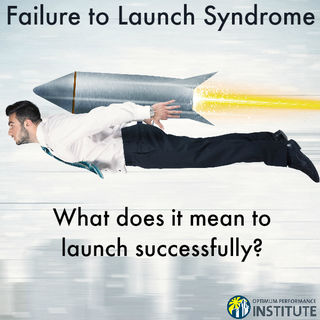Resilience
Failure to Launch Syndrome
What does it mean to launch successfully?
Posted January 20, 2015 Reviewed by Davia Sills

The term “failure to launch” is an increasingly popular way to describe the difficulties some young adults face when transitioning into the next phase of development—a stage which involves greater independence and responsibility. So, what does it really mean to launch successfully into adulthood?
The term “launch” refers to pivotal developmental milestones and transformations, the first of which occurs in early development when learning the skills necessary for more independent activities and decision making. They are defined in developmental terms, such as sensory-motor, neuromotor, social, and learning skills. We begin the acquisition of learning to direct our actions and thinking mind, which allows us to begin to express ourselves, adapt, and move forward.
The process of discovering the fuel (energy/desire) for this launch generally first occurs between young children and their caretakers and facilitates the skillful attachment to a joyful, creative inner and outer world. The child’s world then expands to more socially diverse and complex environments. They go to school. Hopefully, they are exposed to various opportunities to learn to find and express their passions.
They then move from primary to intermediate school, and during this period of time, many manifestations of anxiety become apparent. Young people are beginning to deal with the growing sense of self, sexuality, and awareness and concerns about where they fit in the group. This process continues in the transition between intermediate school and high school, where there is the formation of one’s self: “Am I cool? What do I enjoy? How do I do in school? What do I want to do with myself?”
The launch that we refer to at Optimum Performance Institute starts at the completion of high school when the young adult must decide what to do next. Does he or she want to go to college? If so, why? For many, answers like, “My parents want me to do it,” or “I think this is what I need to do to get a job,” prove to be unsatisfactory, because they do not provide the necessary commitment and focus to deal with intense social and educational demands at college or in the work environment. The young adult must have an inner motivation in order for success to be possible, and they often need guidance to gain clarity and focus in this area.
This launch, more complex than prior developmental launches, requires the internalization of faith in one’s ability to succeed, as well as an appreciation of the concept of interdependence. The young adult needs to tap into a sense of both perseverance and resiliency in order to make independent decisions while learning to simultaneously and skillfully balance the use of the resources of others and the world. No one takes this journey on his or her own. Each of us is both interdependent and independent.
At this stage, many have not yet sufficiently explored different opportunities for social growth and intimacy, and certainly, college affords this opportunity in many ways. Social goals are equally as important as academic, because in the end, even when you have your degree in hand, the ultimate question is, “Are you happy?”
Let’s look at the elements of a successful young adulthood launch through the analogy of a rocket launch:
1. Fueling and Preparation
Is there the fuel level (energy/desire) and motivation to launch? Is it slow-burning yet powerful enough for lift-off? It will take a lot of energy to launch and break the shackles of our fears and negative thinking. Questions to gauge the fuel level are: “Who am I doing this for, and do I believe this is going to make me happy?”
2. Lift-off
There is no substitute for action. We must get out there and take a chance. In trying, we release ourselves from the gravitational pull of our habituated, avoidant, and unskillful responses to fears, anxieties, and unrealistic goals. Lifting off may manifest as heading to college, the workforce, and living independently.
3. The Rocket
The young adult is the rocket, comprised of the body, mind, and spirit/creative self. The self is the vehicle that lifts off and travels to the target of the launch, which is ultimately a balanced life. It is important that one is clear about his or her target and that he or she has a reasonable trajectory with attainable goals mapped out. Support and guidance are often needed with this process.
4. Navigational Skills to Stay On-Course
Acquiring and practicing new skills that allow for the achievement of both short and long-term goals is essential to persevere and guide the vehicle. Once goals are established, what structure is in place that will reinforce them? School? Work? A social network of friends or family? One also needs to develop a rhythm—a sense of internal balance that includes enough play and fun to deal with whatever stressors arise at school and work.
All systems have to be in check—the young adult must figure out how to get along with peers, and the degree of intimacy desired and that can be successfully enjoyed. Thought patterns must be examined. Rather than comparing themselves to idealized notions of others, they can be encouraged to try hard to do their personal best to achieve a balanced life.
5. The Capsule and Refueling
Is there sufficient fuel (energy/desire) to sustain motivation and build internal momentum? We need to be resilient in order to hit the target. It takes a lot of energy to persevere with the ups and downs of progressing through this developmental stage. At times, it will be necessary to replenish our energy stores. This is the process of developing the spirit of perseverance.
What opportunities do we have for refueling? To what degree have we expanded our opportunities to refuel? What do you feel you need to grow? Again, a support system of family and/or friends is essential, as is an acceptance of the reality of interdependence.
6. The Final Common Pathway to the Target: A Balanced Life
Ultimately, for a successful launch, irrespective of any diagnosis or issues that the young adult faces, the final common pathway is that he or she must tap into and identify a passion or passions, experience the joy that comes with expressing those passions, and have opportunities to share this joy with others. There must be a conscious effort to cultivate not just the logic of the mind, but also the desires of the heart. This is what ultimately leads to a sense of balance and satisfaction in life—the ultimate goal.
In our next article, we will begin to explore some of the common pitfalls and stumbling blocks to a successful launch that lead to a “failure to launch.”
Are you concerned that your young adult is experiencing a failure to launch? What specific questions do you have about this issue? We will take into consideration your feedback and questions in our next article.




